As police crack down on homelessness, unhoused end up in Mojave desert
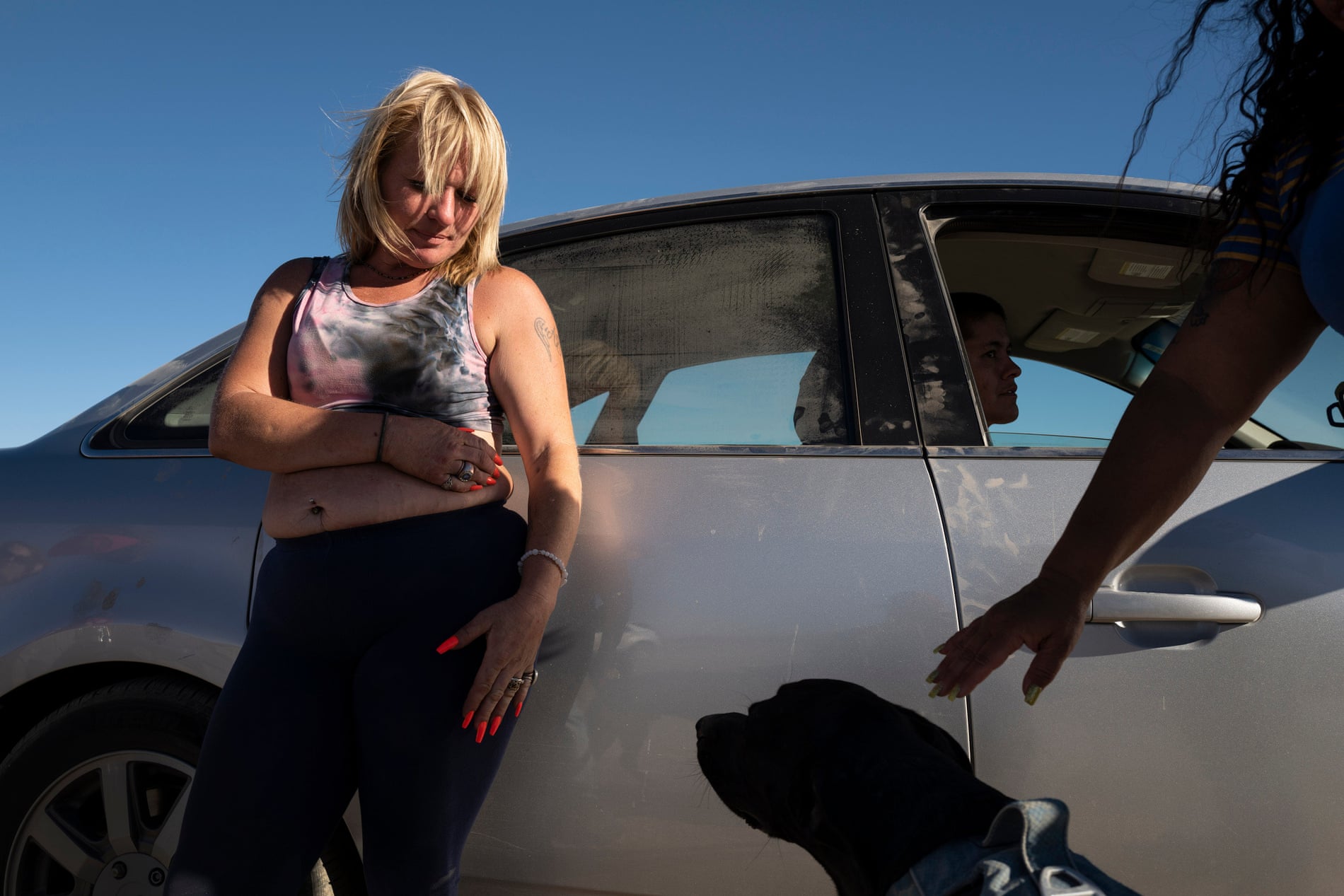
"In a remote stretch of southern California desert, at least 200 unhoused people live outside, battling the extremes: blazing hot temperatures in the summer, snow in winter, rugged terrain inaccessible to many vehicles, a constant wind that blankets everything with silt, and no running water for miles.
For Candice Winfrey, the conditions almost proved deadly.
The 37-year-old lives in a camper in the Mojave desert, on the northern edge of Los Angeles county, miles from the nearest store. During a record-breaking heatwave in July 2020, she found herself running out of water. The jug of a gallon she had left had overheated, the water so hot it was barely drinkable. It was more than 110F (43C), and no one was around to help. She recalled laying in her tent, trying not to think about the heat exhaustion and dehydration overtaking her. “I thought I was gonna die. I was seeing the light. I was just waiting it out and praying to God that I’d make it.”
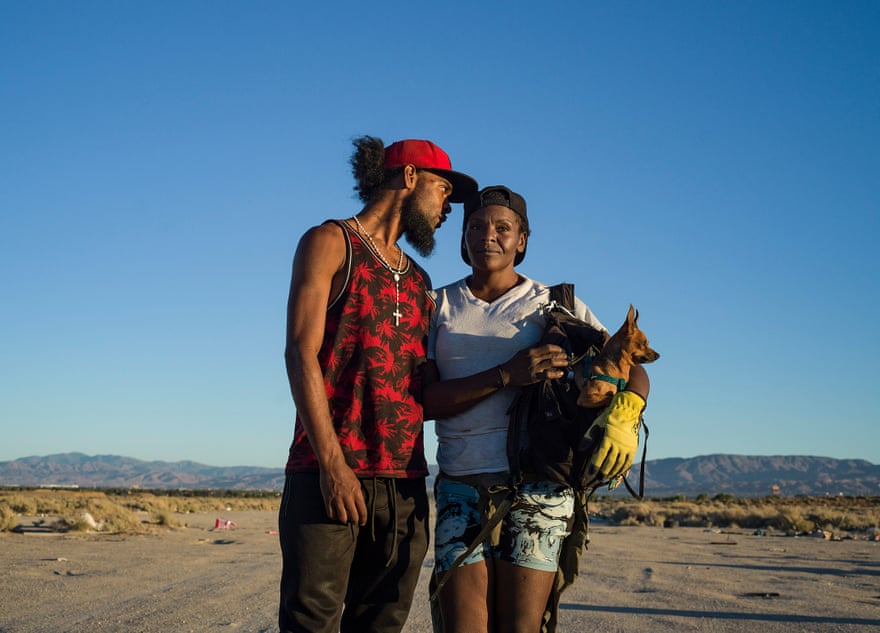
Eventually, she drifted off into a sleep state, she said, reawakening hours later after the sun had started to set and someone came by with cooler water.
Previously, Winfrey and others had pitched tents and parked their trailers in the nearby city of Lancaster. But sheriff’s deputies and other authorities there in recent years have cracked down on homelessness, banning people from camping in certain spots, giving out citations for “loitering” and related violations and conducting encampment sweeps that advocates say destroy people’s belongings.
The measures, unhoused Lancaster residents say, in effect banished them to unincorporated desert land. There, they face less police harassment, but live isolated from paved roads and basic services in town.
As the region enters another brutally hot summer, the crisis has become a public health disaster – one that advocates say illustrates deep flaws in California’s homelessness response.
Data obtained by the Guardian shows that the coroner’s office has logged 246 deaths of unhoused people in Lancaster and the surrounding area since 2015, including 18 deaths in the desert and 29 fatalities so far this year. The deaths sharply increased during the pandemic and include causes such as heatstroke, hypothermia, homicide, heart disease and overdose. The numbers are considered a significant undercount.
“The county isn’t treating this like a humanitarian crisis,” said Eve Garrow, policy analyst and advocate at the ACLU of Southern California, who has worked with desert residents. “Instead of providing aid, law enforcement displaces them to remote areas so far away from resources that it’s a danger to their health and their lives.”
A police crackdown
On a recent windy afternoon, the temperatures outside of Winfrey’s camper reached 90F (32C) – the coolest it had been that week.
The region where people camp lies just north of the Lancaster city limits, located in a picturesque landscape that resembles that of Joshua Tree and other national parks, but without the designated hiking routes and amenities. Discarded items of furniture line the bumpy, off-road paths that lead to the tents and RVs, but little else is visible except sand in every direction and mountains in the distance.
Residents are scattered in small communities dispersed throughout the desert, with some couples and individuals in isolated pockets on their own while others cluster together for safety and support. The campers have different stories about how they ended up there: they escaped domestic violence, lost a home during a divorce or to a fire, faced eviction during the pandemic, struggled with addiction, were ostracized because they were LGBTQ+ or were forced to leave home.
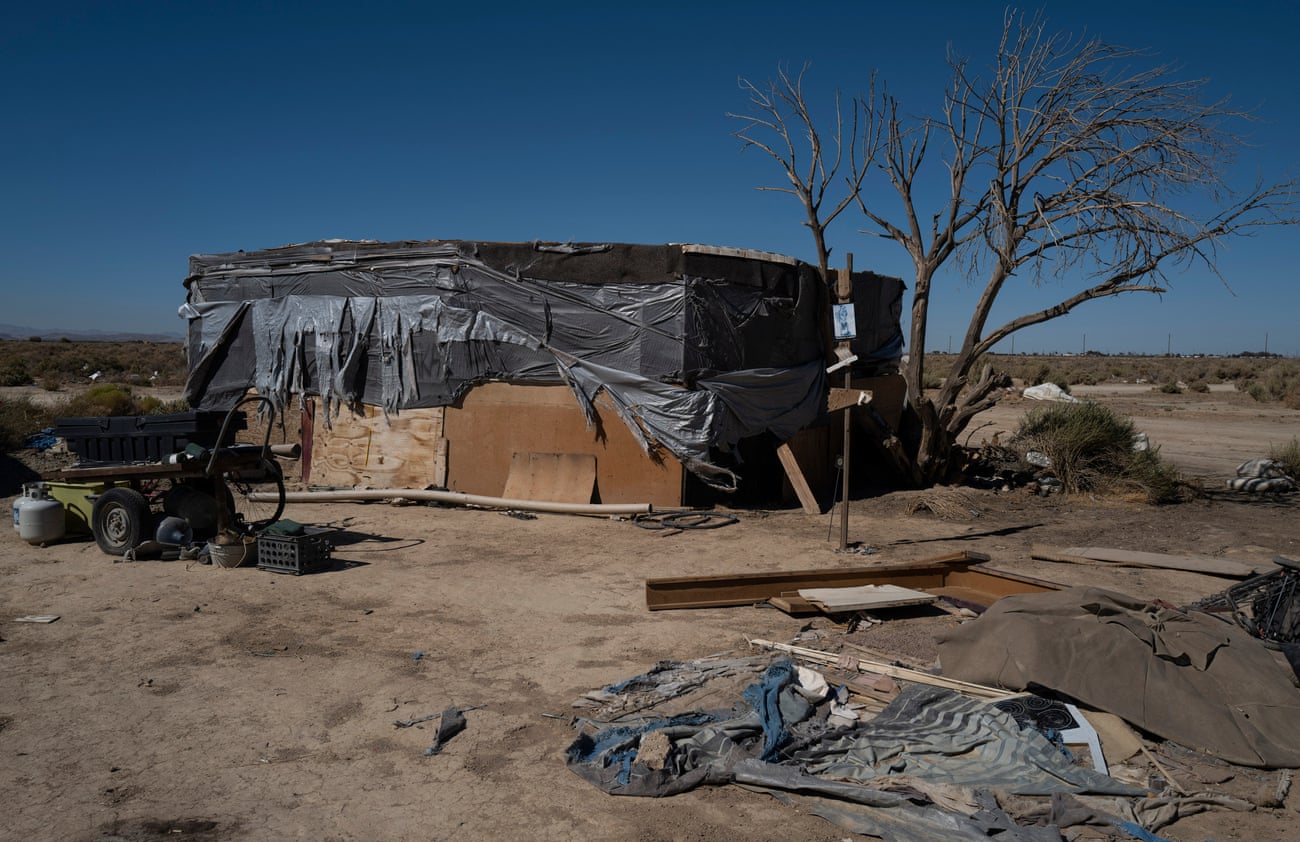
But many of them were first unhoused on the streets of Lancaster.
LA county has received international scrutiny for its homelessness catastrophe and worsening inequality. It’s home to some of the wealthiest neighborhoods in the country, yet has an estimated 66,000 unhoused residents and accounts for 20% of all Americans living outside.
While California is spending an unprecedented amount of money to address this, including by constructing more housing, the fixes have not met the demands, and people are falling into homelessness faster than the unhoused are moving indoors. There have been high-profile encampment shutdowns in the city of LA, in areas such as Venice Beach and Echo Park Lake.
Lancaster’s response has been to criminalize unhoused people’s existence, advocates say.
Lancaster counted 2,053 unhoused people in January 2020 – the latest available data, which is considered an undercount – and the vast majority were living outside in makeshift shelters and vehicles.
But through encampment sweeps and an aggressive ticketing strategy, they’ve slowly forced people out.
“The city of Lancaster treats us like we are a lost cause, like we’re just bums and alcoholics, like we’re dirty and they don’t want to see us,” said Winfrey, who said she became unhoused in Lancaster after relapsing in her struggle with addiction, and losing a job.
She said she used to camp in several locations within the city, including by old train tracks, but authorities kept forcing her to move, leading her to the desert. She is waiting for a subsidized housing voucher. “We are still people. We don’t have to be treated like animals or barbarians,” she said.
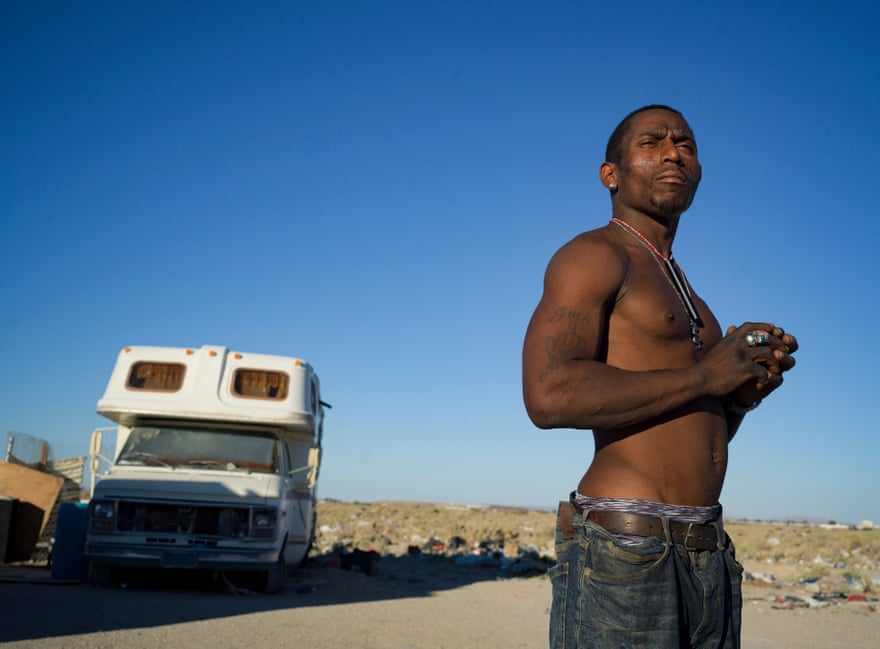
While unhoused people make up nearly 1.3% of the Lancaster population, they accounted for 48% of all police stops for minor municipal code violations in 2020, according to the ACLU, which analyzed public arrest records and obtained citation documents from the LA sheriff’s department (LASD).
Some of the tickets, which were shared with the Guardian, suggest police were explicitly targeting people because they were unhoused.
In March 2019, for example, an LASD deputy took an unhoused man to jail on a solicitation charge, citing as evidence the man’s sign that said, “Anything helps. God bless.” The next month, a man was accused of loitering, and when he rode off on his bike, police followed him and cited him. Another man was questioned by police outside a shopping center and explained he was “sitting in the shade”, but officers gave him a loitering ticket because he “had all his personal items laid out”. Others have been ticketed for having shopping carts and tents or simply for “illegal camping”.
There are also significant racial disparities in the stops: Black residents are 22% of the Lancaster population, but make up 52% of the loitering tickets.
Facing the threat of tickets, which can turn into warrants for arrest and jail time, some say the desert is their only option.
‘Waiting to die’
Out in the desert, residents say they rely on help from a local ACLU chapter and other volunteers who visit them – and they have little hope government workers will come to their aid. The ACLU counted roughly 200 people there on a recent visit, though some advocates believe the number is higher.
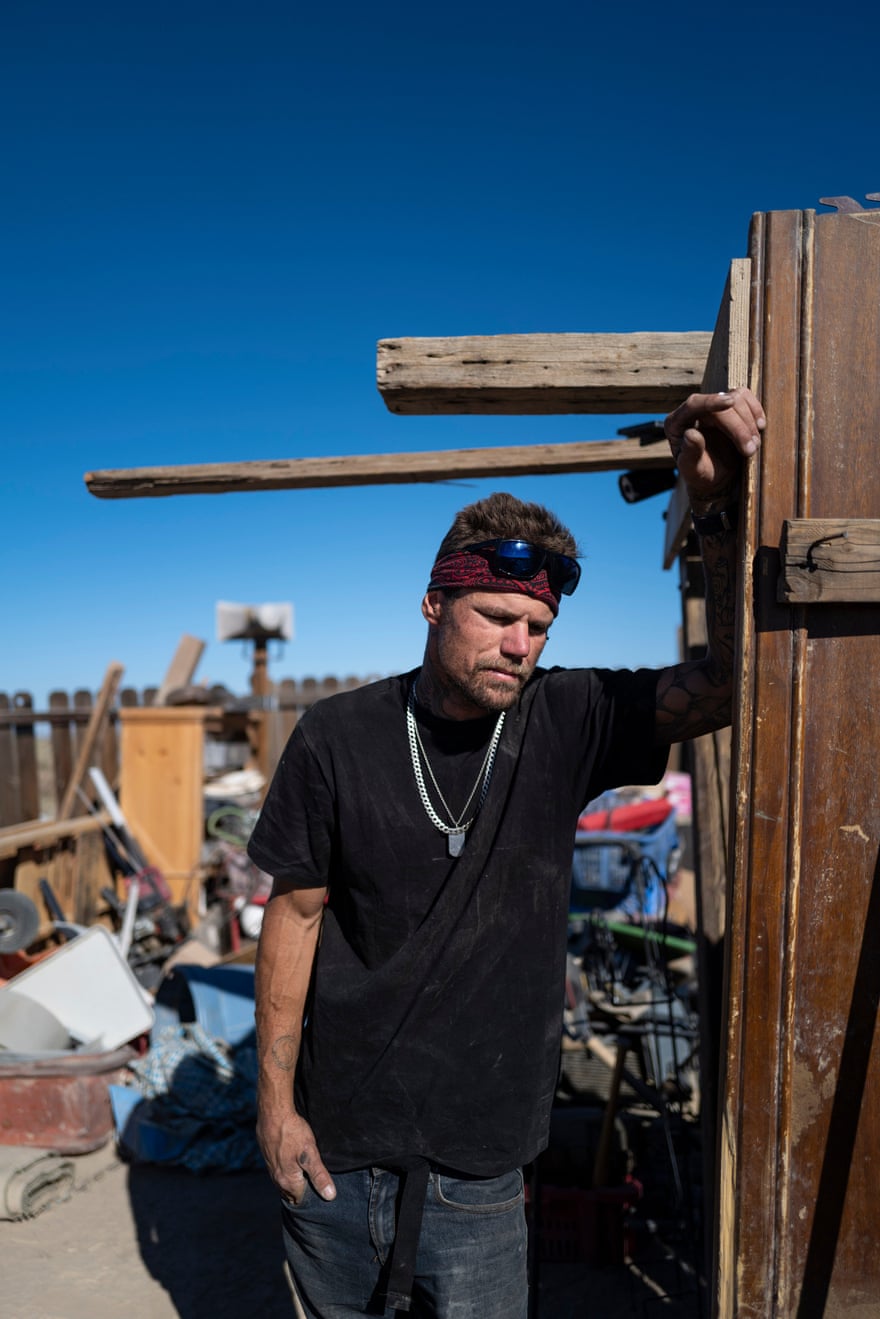
Christopher Saunders, 35, said one encampment sweep in Lancaster cost him family photos and other belongings. Saunders said he was born and raised in the area and became unhoused after losing work as a plumber during the pandemic. After decamping to the desert, he built an impressive structure out of wood, giving him a fence and a roof. He said police don’t bother them much, though occasionally come around to check if people have warrants. When they do show up, they don’t offer services, he said.
He’s given up hope of getting housing, he said: “Trying to figure out how to eat and get water every day, you don’t have time for nothing else.”
Saunders goes into a nearby town once a week to fill up a 450-gallon tank with water, but when his car breaks down he has to walk miles back and forth: “It takes all day to get 10 gallons.”
The struggle for water is a key concern for almost every resident in this extreme climate.
Melissa Ivory, 37, said she has no transportation so she relies on others to get water and other supplies. But everyone has been driving less because of gas prices, she said. “Without water, your skin starts drying up and cracking. The sun does damage to you out here. It knocks you out and removes your energy.” She said she’s trying to navigate the complex housing process, but some days feels too drained to get anything done.
Garrow, the ACLU analyst, recalled meeting one woman in the area who told her she had walked miles carrying five gallons of water back to her camping site. She collapsed upon her return and her phone died, preventing her from seeking help. She rationed water, until her daughter eventually found her: “She was waiting to die and she probably would have if her daughter hadn’t rescued her.”
A plea for aid
The ACLU has urged the local LA county supervisor, Kathryn Barger, whose district includes Lancaster, to seek an end to policies that criminalize the unhoused in Lancaster, including tickets, fines and sweeps.
The civil rights group, which took Barger’s staff out to visit residents in the desert in February, also urged the county to provide water and sanitary services to people living outside, that the county allocate more resources to permanent supportive housing options and that service providers offer them without threats of arrest.
Barger’s office met with advocates again in June, but nothing has changed, the ACLU said. “We’ve been having meetings for a year. How many can we have before you do something? It’s so dangerous out there,” said Ruth Sanchez, an ACLU advocate who drops off supplies weekly.
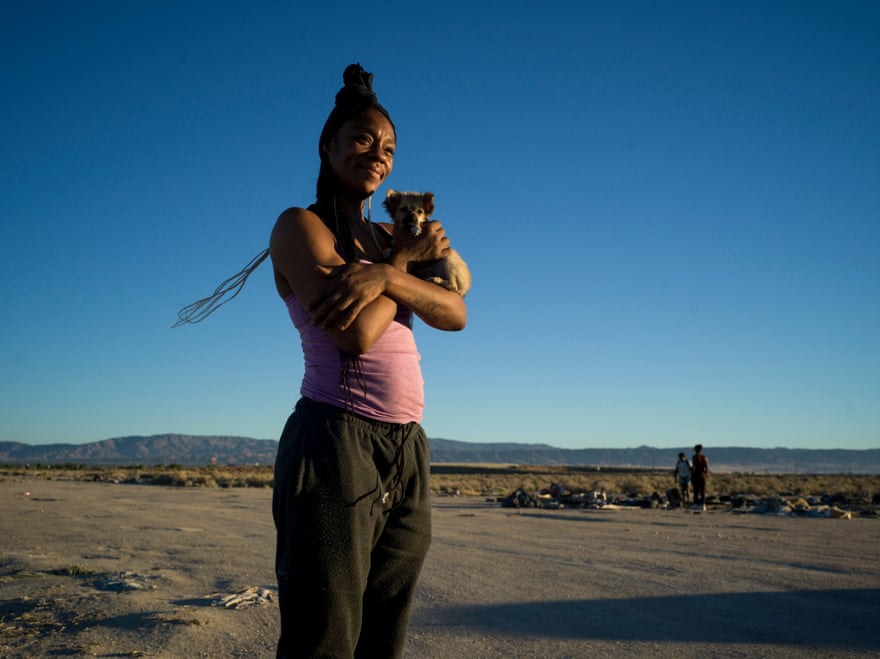
Barger did not respond to questions about homelessness in the Lancaster region, but said in a statement, “I am deeply concerned by the increasing rates of homelessness and homeless related deaths in Los Angeles, especially those in [my district]. It is unacceptable and a grim reminder that the status quo isn’t working.” She said the county was in the process of revamping its approach to how it coordinates services.
Barger’s spokesperson referred inquiries to the county public health department and the LA County Homeless Initiative, which oversees homelessness spending and housing efforts, and both agencies declined to comment. The Los Angeles Homeless Services Authority (Lahsa), which does outreach across the county, did not respond to inquiries about desert residents. LASD, run by a sheriff who has campaigned on a platform of cracking down on homelessness, declined to comment.
Lancaster’s mayor, R Rex Parris, has criticized the ACLU, telling a local reporter last year: “We’re not dropping these people out in the desert. I don’t want people out there with no water. But they’d rather go out into the desert than go back to LA where they’re [at risk of being] raped and killed.” He said he was not at “war” with unhoused people, but added, “Am I going to allow people to sleep wherever they want and try and get money from people who are shopping? That’s not going to happen.”
Parris, a Republican, also made headlines when he suggested residents arm themselves in response to the growing unhoused population. He defended his comments by calling unhoused people “criminals and thugs”.
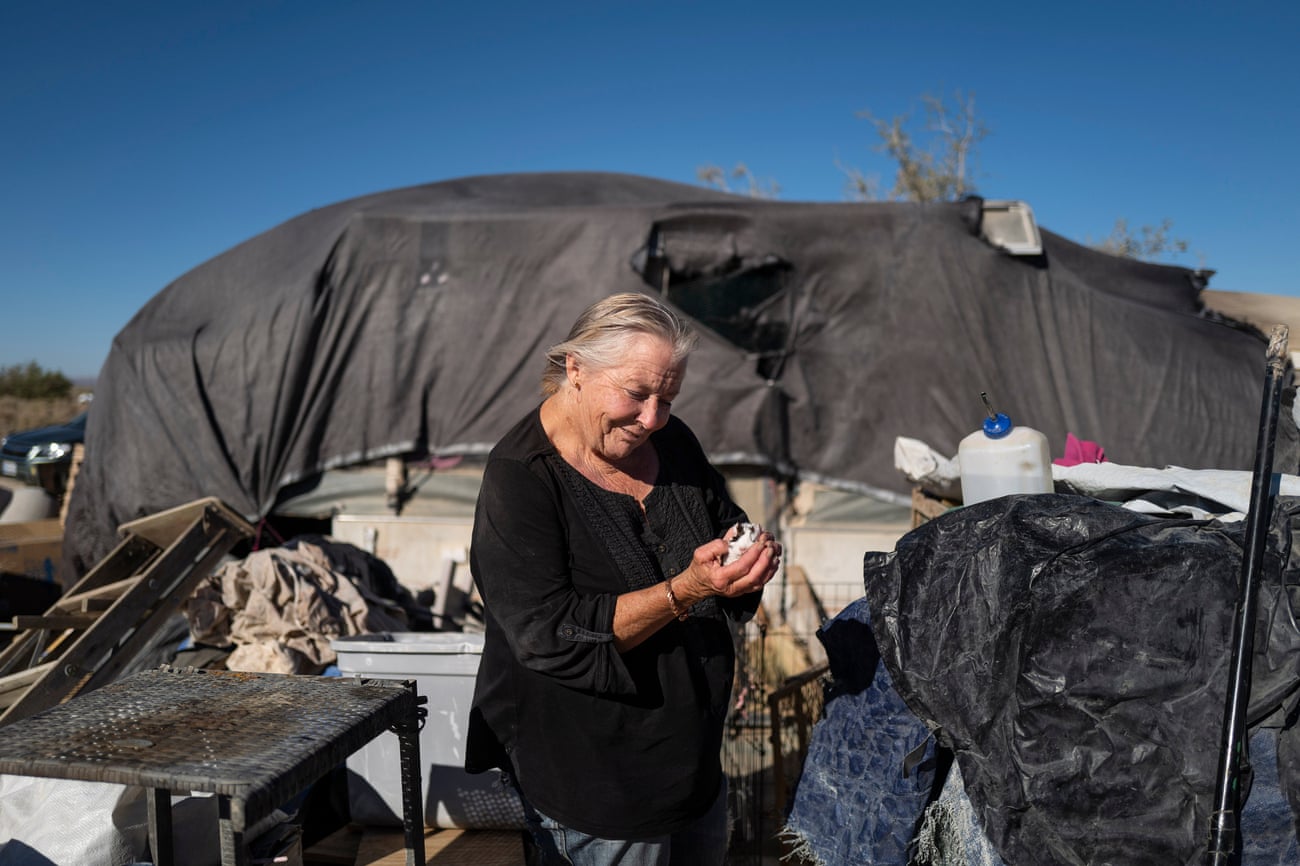
A Lancaster city spokesperson pointed to the city’s new 14-acre campus that provides unhoused people with services and living quarters, including 150 permanent supportive housing units, and said there were four additional housing projects in the works meant for currently or formerly unhoused people. The spokesperson did not respond to questions about any efforts to assist people in the desert.
Parris defended law enforcement’s treatment of the unhoused, saying in a statement, “It continues to be in the public interest that persons who commit misdemeanor offenses be held accountable for their crimes.” He also said the city’s goal is to divert people from the criminal system when possible, and that he doesn’t want “low-level offenders to have criminal records”. The mayor said that the city abides by court rulings that prohibit the arrest of unhoused people for sleeping in public, unless shelter is offered.
Tracey Sutton, 47, who grew up in Lancaster and now has a tent and RV in the desert, scoffed at the mayor’s suggestion that people wanted to be there or were coming from outside of the region to camp there.
“Lancaster is my home, my home. Why should I have to leave my home?” said Sutton, who has been unhoused for several years but moved from the city to the desert last year. Pointing to her RV, she added, “I have a home, I just have nowhere to park it.” The shelter options she has been offered would not allow her to stay with her husband or keep her dogs, she said.
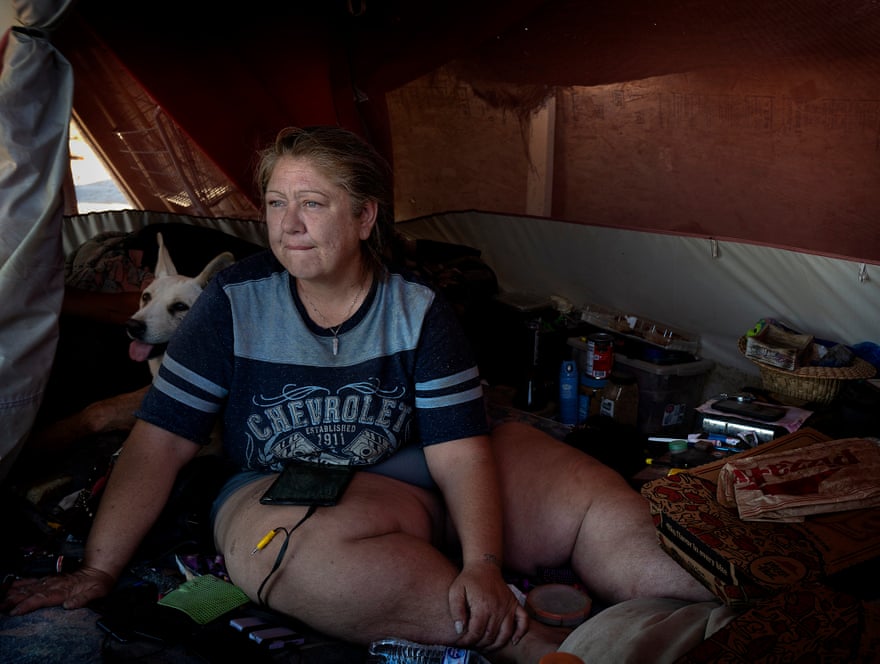
If officials aren’t going to get them housing, they could at least stop hassling them, Sutton added: “We’re not bothering you. Leave us alone.”
But some desert residents are worried that even out in their remote camping spots, they will once again have to move. In recent weeks, someone put up a large sign near some of their RVs that read: “No parking. No trespassing. Violators will be prosecuted.”
Residents aren’t sure who put it up or who might be enforcing it, but they are bracing for the worst: that they may have to move even further out into the desert this summer."
No comments:
Post a Comment